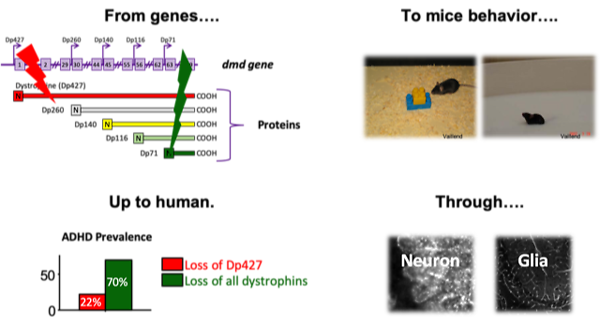Seminar by Dr. Rémi Chaussenot, University Paris-Saclay, Orsay, France

Date
Location
Description
Title: Neurobiology of cognitive deficits in murine models of Duchenne muscular dystrophy
Abstract:
Duchenne muscular dystrophy (DMD) is a neuromuscular syndrome caused by mutations in the dmd gene, leading to the loss of dystrophin proteins, which are normally expressed in various tissues including the brain. Patients exhibit heterogenous cognitive profiles and the presence of intellectual disability depends on the location of the mutation within the gene. This variability can be explained by the complexity of the dmd gene, which includes several internal promoters leading to the cerebral expression of several dystrophins of different sizes. In this work, we focused on two dystrophins : the full-length dystrophin (Dp427) normally expressed in muscle and brain and lost by all DMD patients, and the shortest dystrophin, Dp71, major cerebral product of the dmd gene that is absent in a subgroup of patients. These two dystrophins have distinct cellular functions : Dp427, normally interacting with GABA receptors in inhibitory synapses, plays a role in synaptic plasticity, learning and memory. Its loss leads to mild cognitive deficits. Dp71, mostly expressed in perivascular astrocytes, contributes to the anchoring of ionic channels involved in brain homeostasis and also plays a role in glutamatergic synapses. Dp71 loss strongly aggravate the deficits associated with the loss of Dp427 in patients and lead to severe intellectual disability. Genotype-phenotype relationships need be further specified and it is assumed that beyond deficits severity, the actual nature of cognitive alterations, as well as the presence of sensorial, cognitive, executive and neuropsychiatric disturbances, depend on the specific forms of dystrophin affected by mutations. To study the role of these two dystrophins, we used two mouse models : the mdx mouse that only lacks Dp427, and the Dp71-null mouse that only lacks Dp71. A extensive behavioral study allowed us to better characterize the phenotype associated with the loss of Dp427 and Dp71, detailing integrity of perception and processing of auditory sensory stimuli, of emotional responses and stress reactivity, of learning performance, and of components of executive functions, such like spatial working memory and behavioral flexibility. The work has been completed by collaborative studies aimed at characterizing the role of Dp71 in cortical plasticity and at developing gene therapy approaches to rescue Dp427 function in the mdx mouse. We demonstrate that Dp427 loss perturbs GABAergic functions, stress-induced emotional responses, as well as emotional and long-term memories. We also show that a gene therapy based on systemic injections of antisens oligonucleotides holding specific chemistries and crossing the blood-brain barrier enables Dp427 functional rescue by exon-skipping strategy and alleviates emotional disturbances in mdx mice. The loss of Dp71 has a distinct impact : It alters cortical excitation/inhibition balance and plasticity and disrupt learning, behavioral flexibility and working memory in spatial learning tasks. Our study of these mouse models therefore enabled to clarify the genotype-phenotype relationships and neurobiological bases of this disease, and identified valuable phenotypes to validate treatment efficacy in future brain-targeting preclinical studies.
Subscribe to the OIST Calendar: Right-click to download, then open in your calendar application.



